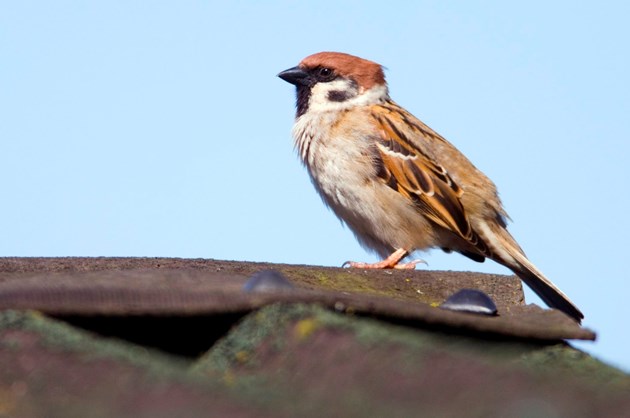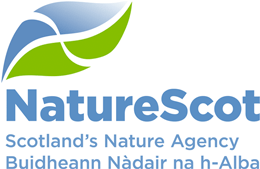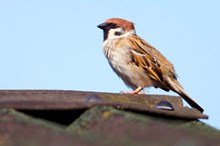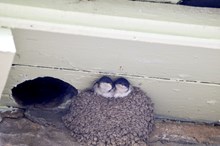05 April, 2017
Public urged to avoid birds’ nests during gardening and building work

As birds begin to nest this spring, Scottish Natural Heritage (SNH) and the Partnership for Action Against Wildlife Crime (PAW Scotland) are reminding the public to be aware that birds are vulnerable at this time of year and destroying or damaging a nest while it’s in use is illegal and could result in a penalty.
Every year, birds’ nests are destroyed by people felling or pruning trees and scrub or doing building work. Other common examples are blocking entry holes to swift and starling nests located in houses, house martin nests being damaged under the eaves of houses, and bird nests being damaged while sites are being cleared for development. As well as these risks to wildlife, dogs which aren’t under control may disturb ground nesting birds.
It is illegal to destroy, damage, take, obstruct or interfere with any wild bird nest while it is being built or in use, under the Wildlife and Countryside Act 1981. The penalties can be up to a maximum £5,000 fine and/or six months’ jail. Nests don’t need to have eggs or chicks present to be regarded as being ‘in use’, but may be ‘in use’ from the moment nest building begins.
In certain situations, SNH may grant licences to allow development works to continue legally; these may include instances where there is a significant public health and safety issue or other cases of overriding public interest.
Andy Turner, SNH’s wildlife crime officer, said:
“Birds are very vulnerable during spring and summer, so we’d urge people to be very careful and check for nests before beginning any major garden or building work. With many of our garden bird species declining, a few simple checks or changing the timing of works to avoid the bird breeding season can help conserve birds and prevent offences from being committed.”
Ian Francis, RSPB conservation manager for East Scotland, added:
“In the past 12 months, the RSPB has received over 2,000 enquiries from the public about potential wildlife crime, of which at least 300 related to possible destruction of nests and around 90 related to possibly destroying nesting habitats such as hedges and trees. This is a matter that concerns many people, and we urge home owners and anyone managing land or buildings to follow the available guidance and avoid harming nesting birds.”
Any suspected offences in relation to birds (or any other wildlife crime) should be reported to Police Scotland as soon as possible on 101.
Developers should be aware that a valid planning consent does not over-ride the need to comply with the law on species protection. Developers must put in place safeguards to ensure that construction doesn’t result in an offence being committed. If birds’ nests that are in use are discovered during construction or development works, all works which could damage, destruct or obstruct a nest must stop immediately and a licence sought from SNH. The same applies to other protected species commonly found in buildings, including bats. Guidance is available for developers on the SNH website at http://www.snh.gov.uk/docs/A514967.pdf
Combating wildlife crime is one of the key steps to deliver the goals of the Scottish Biodiversity Strategy – in particular, conserving wildlife in Scotland.
ENDS
Media queries - contact SNH media & public relations officer, Vicki Mowat, on 0131 316 2659 or vicki.mowat@snh.gov.uk (Tues to Thurs) or the Inverness press office on 01463 725 022.
NOTES TO EDITORS
The Partnership for Action Against Wildlife Crime Scotland (PAW Scotland) represents a wide range of bodies concerned with the prevention and tackling of crimes against wildlife. It includes agencies like Scottish Natural Heritage, Police Scotland and prosecutors as well as organisations representing a wide range of conservation and land management interests. The Executive of PAW Scotland is chaired by the Minister for the Environment, Climate Change and Land Reform.
Contact information
- Name
- SNH Media
- snhmedia@snh.gov.uk
Notes to editors
The Partnership for Action Against Wildlife Crime Scotland (PAW Scotland) represents a wide range of bodies concerned with the prevention and tackling of crimes against wildlife. It includes agencies like Scottish Natural Heritage, Police Scotland and prosecutors as well as organisations representing a wide range of conservation and land management interests. The Executive of PAW Scotland is chaired by the Minister for the Environment, Climate Change and Land Reform.
NatureScot is Scotland's nature agency. We work to enhance our natural environment in Scotland and inspire everyone to care more about it. Our priority is a nature-rich future for Scotland and an effective response to the climate emergency. For more information, visit our website at www.nature.scot or follow us on X at https://x.com/NatureScot
’S e NatureScot buidheann nàdair na h-Alba. Bidh sinn a’ neartachadh àrainneachd na h-Alba agus a’ brosnachadh dhaoine gu barrachd suim a chur ann an nàdar. Tha e mar phrìomhachas againn gum bi nàdar na h-Alba beairteach agus gun dèilig sinn gu h-èifeachdach le èiginn na gnàth-shìde. Tha an tuilleadh fiosrachaidh aig www.nature.scot no air X aig https://x.com/NatureScot


